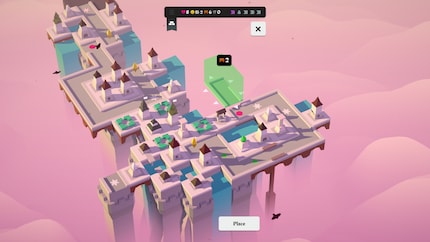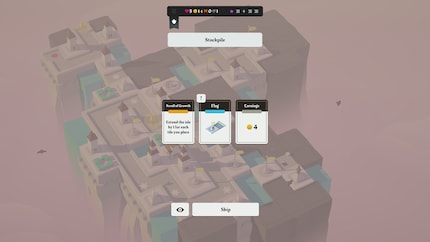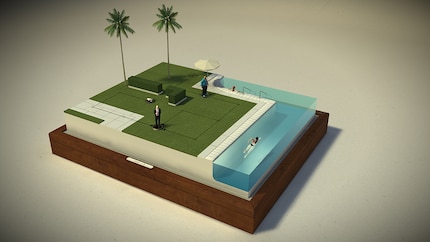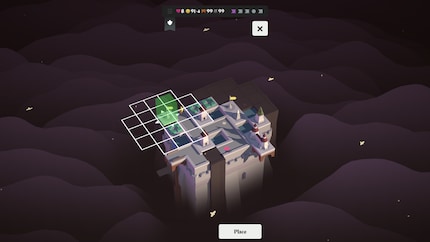
Background information
Metroid Prime 4: Beyond preview – Nintendo’s finally won me over
by Domagoj Belancic

After more than twelve years at Square Enix Montreal, Swiss game designer Daniel Lutz is going his own way with «Isle of Arrows». How he ended up in Canada and how to find fun in a game, he reveals in the interview.
Originally, Daniel Lutz wanted to take some time off. Instead, the expatriate game developer is working on the project «Isle of Arrows» all by himself. Prior to that, he made a name for himself as Creative Director at Square Enix Montreal. His best-known projects include «Hitman GO» und «Lara Croft GO». Their minimalist design really sets them apart. These smartphone puzzle games are a far cry from their famous templates. In spite of this, the games were a huge success. Later on, they were even released for PC and consoles.
Months before Square Enix announced that they’d be selling their studio to Embracer Group (article in German), Daniel had already handed in his notice to work on «Isle of Arrows». In this interview, he talks about his experiences at Square Enix and his new job as a solo developer.
If you don’t feel like reading, you can also listen to the interview as part of the digitec podcast. The interview starts at 59:30.
What can we expect from your new game «Isle of Arrows»?
Daniel Lutz, Game Designer: A bird’s-eye view, a chessboard-like playing field and lots of tinkering about feature in all my games – and «Isle of Arrows» is no exception. However, the game principle is new. It’s in the same vein as Tower Defense, but ties into my previous idea of a chess-like board game. You use tiles to build a floating city in the clouds and then defend it against waves of enemy attacks.
You worked for one of the biggest game studios in the world for a long time. Now, you’re going it alone by developing and publishing «Isle of Arrows» in your one-man studio Gridpop. How did that come about?
After almost ten years at Square Enix, I wanted to take some time off to figure out what to do next. I often work on my own games and ideas in my spare time. This was also the case last December when I flew to Switzerland. I was trying something out on my laptop mid-flight and suddenly had this idea for a game. My time-out and the game idea overlapped perfectly. And because I was having so much fun with the game, I quit my job at Square Enix to fully focus on my new project.

I often wonder how a game like this is created. Would you say this is a typical case? Playing around with an idea and suddenly it all falls into place?
It depends. I often have ideas, even if it’s just two sentences I scribble down on a piece of paper. As was the case here. I made a quick note on my phone that it would be cool to combine Tower Defense with laying down tiles. But I never pursued the idea. It wasn’t until I had enough time on my hands that I took a second look at it and thought: I might be onto something. This kind of breakthrough either happens or doesn’t. My ideas usually come to an end if it doesn’t.
«The person you need to convince most is yourself.»
So you had a breakthrough moment with «Isle of Arrows»?
Exactly. I developed a test version and showed it to a few friends. I soon realised it had potential. All of them wanted to keep playing to improve. And that’s exactly what you’re looking for.
So searching for the fun factor of a game is a shot in the dark?
Totally! Even after being in the business for over twelve years, that’s the best answer I can give you. It’s such an exciting subject. The requirements are totally different when you’re working on your own project as opposed to at a big company. If you’re part of a team of 50 people or more, you can’t wait until someone says the game’s fun before you start working on the rest. Instead, you’re working on 3D models, systems, architectures, etc. from the very start. Working on the idea happens simultaneously. Logistically, everything runs in parallel. Sometimes, after two years of working on a game, you realise it’s not fun.
«I’m a bit of a lone wolf. It seems to be a typically Swiss trait. At least that’s what my Swiss friends tell me.»
What’s the first step in developing? What do you start with?
I’m not the type to think about things for very long. I just give them a go instead. Even when I write down my ideas, I make a point of not pondering on them for too long. Programming is certainly at the top of the list because it’s the fastest way to try something out. In the corporate world, you present something first and then that’s discussed. When you’re working alone, the person you need to convince most is yourself.

At Square Enix, you were Creative Director, which is also a project manager. For «Isle of Arrows», you have to do all the work yourself. What do you like the most and which tasks do you struggle with?
I really do everything myself. That’s my style. I’m a bit of a lone wolf. It seems to be a typically Swiss trait. At least that’s what my Swiss friends tell me. In any case, it makes a nice change from what I was doing at Square Enix. There, you’re only in charge of a very small part and have people who are specialised. I enjoy doing everything, but there are things I’m better at than others. Audio isn’t really my thing, for example. But I have a lot of friends who work in that field who give me tips and feedback. Unfortunately, that doesn’t make the result amazing either. Being your own boss means things won’t always turn out the same way as when you’ve got the best people working on them. The game has a bit of a DIY feel about it. On the upside, I get to determine everything myself.
«In Montreal, video game companies are literally fighting over employees.»
If you do feel like outsourcing a task one of these days, you’re in the right spot in the developer mecca that is Montreal. How did you end up there in the first place?
After my studies, I felt like working for a game company abroad. In Switzerland, there was hardly anything going at the time. My uni gave me a contact in Montreal. I got in touch, but nothing came of it. Not surprising, really. Who would want a Swiss student who develops indie games nobody was really interested in? Not to mention my lack of a work visa and zero work experience. But my mind was set. I just had to go there. I bought a one-way ticket and flew to Canada. And after going for a few interviews, I actually got a job at EA. My strategy turned out to be right.

Is Montreal still an attractive place to work?
Definitely. In the last four or five years, it’s grown rapidly. Since the pandemic and with working from home, it’s become even easier to set up a studio here. However, the demand for qualified staff is so high that employers are literally fighting over employees. Montreal’s one of the most attractive places for game developers in the world.
I assume that Canada has better labour laws than the US. But still, the game industry is likely to be a tough place over there as well.
That’s the problem with this industry. Many people want to work in this field. That’s why companies can get away with murder. Take crunch, for example – that final spurt where you’re expected to do a lot of overtime. This wouldn’t work in other industries. Having said that, things have improved in the last few years. Take Eidos, for example. Their employees only work four days a week. At Square, every other Monday was off. Crunch was rare – at least for my teams. The companies have realised that this image is damaging them.
What would it take for a scene like Montreal has to develop in Switzerland?
I’m often asked this question. It’s very difficult for me to tell, as I’m not in touch with the Swiss scene. But one important aspect is cost of living. Montreal is an affordable city by North-American standards. Wages are lower and there are many subsidies available. Large productions require a lot of people, so factors like this are crucial. Having said that, a lot’s been happening in Switzerland in the last few years. We’ve seen some important studios emerge.

Location is one thing, the platform another. Xbox Game Pass or Apple Arcade are making subscription services increasingly popular. Would you say this is an opportunity or a threat for game developers?
Monetisation has a massive impact on how and what kind of game you make. The best example for this is mobile games. Nobody was willing to spend money on them anymore, so everything is free now. Free-to-play games are made to get you hooked fast, keep you playing for years and spending as much money as possible on the way. The first few minutes of gameplay will give you a big hit of dopamine. This will have an impact on what kind of games are developed for subscription services. It also depends on what type of behaviour platform owners want users to engage in.
Like getting users to interact with a game for as long as possible?
Exactly. Microsoft could implement reward systems for developers, where more money is paid out with each additional hour played. This could lead to games being designed to go on and on. Square Enix has always been sceptical of such platforms. For large companies, they’re financially less interesting than free-to-play models, which are easier to monetise.
Subscription services have long since become established in the movie and music industry.
Their impact is palpable. Streaming behaviour has completely changed the face of pop music. There are no more intros. Today, pop songs have to ignite in the first five seconds. As an artist, you could say that this sucks, because you’re prevented from making real music. But I believe there’s an interesting aspect to it, because you need to find a creative way of dealing with this world. Tiktok has also created a new wave of content. That’s why I’m curious to see how games will develop through subscription services.
Can we expect to see your game in Game Pass?
I can neither give you a precise release date, nor can I say if it will be free or not. I also need to figure out how things work between the mobile and PC versions. In any case, I’ll keep you posted.
If you like the sound of «Isle of Arrow», you can add the game to your wish list on Steam.
As a child, I wasn't allowed to have any consoles. It was only with the arrival of the family's 486 PC that the magical world of gaming opened up to me. Today, I'm overcompensating accordingly. Only a lack of time and money prevents me from trying out every game there is and decorating my shelf with rare retro consoles.
Interesting facts about products, behind-the-scenes looks at manufacturers and deep-dives on interesting people.
Show all
Background information
by Domagoj Belancic

Background information
by Domagoj Belancic

Background information
by Domagoj Belancic